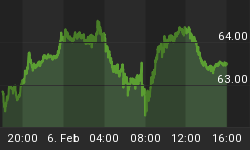The global economy is in turmoil. Europe is on the verge of collapse, probably taking the US down with it. As the euro-crisis worsens, we march ever closer to outright monetization of European debt by the ECB and, covertly, by the Federal Reserve. The developed world is perilously close to a monetary deluge that could make the Weimar Republic's hyperinflation look like amateur hour.
Yet, I still talk to Wall Street analysts who clearly misunderstand gold's place in a portfolio. Meanwhile, many people who are part of the world's wealthy class are hoarding gold. What do they know that others don't?
If you ask the common man in the street about investing in gold, most will give you a strange look. After all, they believe investing is about stocks, bonds, and CDs.
If you ask someone with a bit more investing knowledge, they will tell you to buy gold during inflationary periods.
If you ask a relatively sophisticated investor, they will tell you to buy gold during deflationary and inflationary periods. Some may even say to buy gold during periods of uncertainty and instability, or when real interest rates are negative.
However, if you ask the world's wealthy class about gold they will give you a very different answer. At Plan B Economics, we've found that most of the world's wealthy class doesn't view gold as an investment at all! I would argue these folks have it right. Simply put, they consider gold to be a store of wealth and believe that anytime is a good time to own some gold.
With wealth storage (a.k.a. wealth preservation) as their goal, the rich are less fixated on daily fluctuations in gold prices. They aren't trying to earn short-term profits from gold ownership - they are trying to maintain their overall purchasing power. Since the wealthy have large asset bases, losses in purchasing power add up to big dollar figures, but the wealth preservation characteristics of gold are just as beneficial to the middle class.
Gold can protect real wealth because it tends to move in a different direction than other types of assets (i.e. gold is negatively correlated with other assets), making it an effective portfolio diversifier. When gold prices are falling, other forms of wealth are often rising in real terms. When gold is rising, other assets are usually falling in real terms. Gold has an offsetting effect when it is part of an overall asset base - but there are more important reasons the wealthy own gold.
As the world sinks into greater financial and political uncertainty, the wealthy want to protect their families from the unthinkable. Physical gold can store substantial wealth in a compact, universally-accepted form that can be hidden from the prying eyes of governments. So if/when collapse truly occurs, as it has consistently throughout history, the wealthy can escape with a big portion of their assets.
At this point, some of you reading this may be rolling your eyes, thinking such asset positioning is reserved for conspiracy theorists and survivalists, but history and current anecdotal evidence suggest this is how many wealthy people think. In fact, since I began writing on economics, I have encountered many wealthy people who have caches of food, precious metals, and weapons (but rarely admit it). They are acutely aware that if society broke down, they'd be the first scapegoats of the masses and any government rising to fill the power vacuum.
Ask the wealthy and middle class people who escaped Hitler's Germany (or many other similar authoritarian regimes throughout history) about gold. These people left behind houses, businesses, and paper assets to escape their home country. They even left behind savings and securities accounts, the withdrawal of which would have alerted authorities. (Moreover, German currency and securities were worthless in the eyes of non-German financial institutions.) They did, however, take as much gold as was physically possible. To these people, gold wasn't an investment, but a way to smuggle a lifestyle across borders in a suitcase.
I believe gold can provide the same utility to the wealthy and middle-class alike. Everyone should have a portion of their wealth stored in a fungible, highly-concentrated, portable form. The goal here is to prepare, not to predict. After-all, you buy homeowner's insurance but never expect your house to burn down.
So next time you consider gold as an investment, ask yourself why you are buying it. If you're worried about 20% up and down moves, then you are simply speculating on the price of gold. If you're looking for a portfolio diversifier, then you will be willing to accept gold's counter relationship to other asset classes. But if you are truly looking to protect from economic or political collapse, and need an enduring store of wealth, you may want to think like the wealthy class and hold physical gold in a hidden yet easily accessible location.
This article first appeared in the January 2012 edition of Peter Schiff's Gold Report, a monthly newsletter featuring original contributions from Peter Schiff, Casey Research, and other leading experts in the gold market. Click here for your free subscription.















